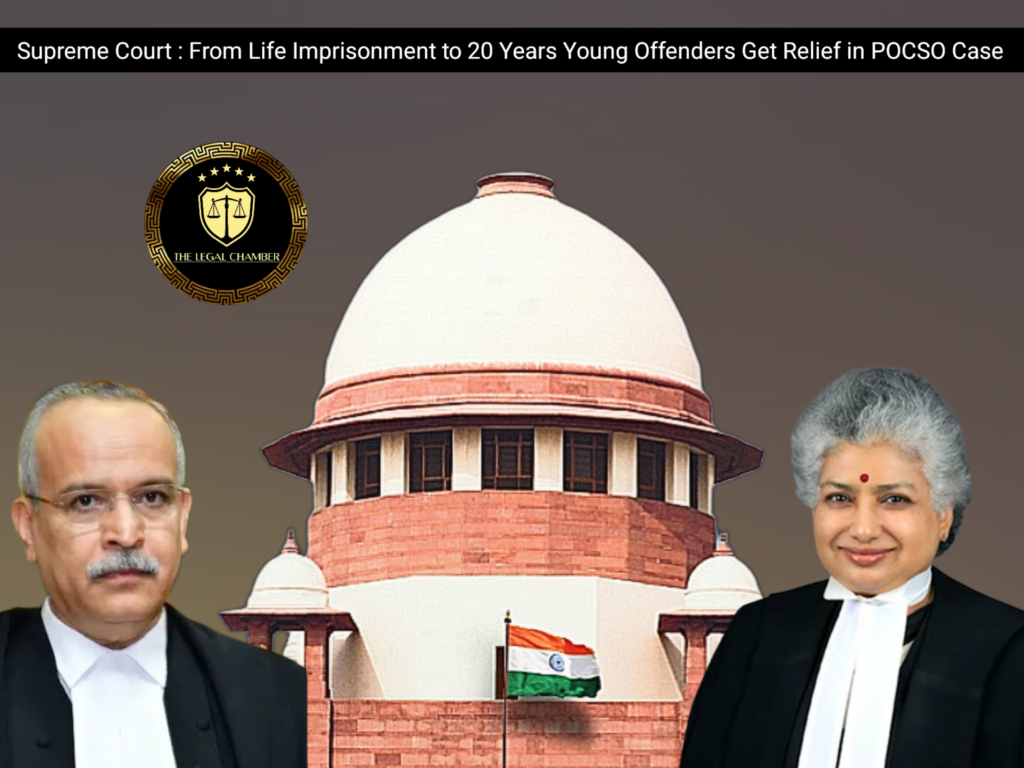
The Supreme Court of India granted leave to appeal against a High Court judgment dated April 26, 2024, which affirmed the conviction of appellants under various sections of the IPC and Section 6 of the POCSO Act, 2012, including imprisonment for life. While upholding the conviction, the Supreme Court partially allowed the appeals, reducing the sentence from life imprisonment (remainder of natural life) to twenty years of rigorous imprisonment based on Section 6 of the POCSO Act and considering the appellants’ age and incarceration period.
Facts Of The Case:
Pintu Thakur @ Ravi and other appellants were convicted by the Additional Sessions Judge, Fast Track Special Court (POCSO Act), Ramanujganj, District Balrampur, in Special Sessions (POCSO) Case No. 36/2020. This conviction was subsequently affirmed by the High Court of Chhattisgarh in Criminal Appeal No. 1686/2023 and Criminal Appeal No. 2130/2023 through a judgment dated April 26, 2024. The appellants were convicted under Sections 363, 366, and 342 of the Indian Penal Code, and Section 6 of the POCSO Act, 2012, receiving jail sentences including five years each for IPC 363 and 366, one year for IPC 342, and imprisonment for life (remainder of natural life) for Section 6 of the POCSO Act. Fines were also imposed, with default clauses. All sentences were directed to run concurrently. Aggrieved by the High Court’s judgment, the appellants filed appeals before the Supreme Court of India. They raised two main submissions: firstly, that their conviction by the Trial Court was erroneous ; and secondly, if the conviction was upheld, then their sentence under Section 6 of the POCSO Act should be reduced. They argued that the minimum sentence under Section 6 of the POCSO Act is twenty years, and the life imprisonment imposed was harsh, especially since they were in their early twenties at the time of the incident and had completed a little over five years of incarceration. The respondent-State, however, vehemently objected, asserting that the High Court rightly affirmed the conviction and that the life imprisonment sentence was in accordance with Section 6 of the POCSO Act.
Procedural History:
The procedural history of this case began with a conviction by the Additional Sessions Judge, Fast Track Special Court (POCSO Act), Ramanujganj, District Balrampur, in Special Sessions (POCSO) Case No. 36/2020. This judgment was subsequently challenged in the High Court of Chhattisgarh through Criminal Appeal No. 1686/2023 and Criminal Appeal No. 2130/2023. The High Court, on April 26, 2024, affirmed the conviction. Following the High Court’s decision, the appellants, Pintu Thakur @ Ravi Etc., filed a Special Leave Petition (Crl.) Nos. 16689-16690/2024 in the Supreme Court of India. The Supreme Court granted leave to appeal. The matter was heard by a bench comprising Hon’ble Mrs. Justice B.V. Nagarathna and Hon’ble Mr. Justice Satish Chandra Sharma on May 27, 2025. The Supreme Court ultimately allowed the appeals in part, reducing the sentence while upholding the conviction.
READ ALSO : Supreme Court Stops Misuse of Rape Laws : No Rape If Relationship Was Consensual
Court Observation:
The Supreme Court, after hearing arguments from both sides, observed that it was not inclined to interfere with the judgment of conviction passed by the Special Court and affirmed by the High Court. However, the Court carefully considered the appellants’ submission regarding the reduction of their sentence in light of Section 6 of the POCSO Act. The Court noted that Section 6 of the POCSO Act prescribes a minimum punishment of twenty years, which may extend to imprisonment for life, meaning imprisonment for the remainder of the natural life, or even death. The Special Court had imposed the higher punishment of life imprisonment for the remainder of natural life, which was upheld by the High Court, without considering any mitigating circumstances.The Supreme Court highlighted that the minimum sentence under Section 6 of the POCSO Act is twenty years. Bearing in mind that the appellants were in their early twenties at the time of the incident and had completed only five years of incarceration, the Court reasoned that even to complete the minimum sentence, they would need to serve another fifteen years, reaching their early forties. Considering these factors, the Court found that the interest of justice would be served by reducing the sentence from imprisonment for life (remainder of natural life) to twenty years. Consequently, the appeals were partially allowed, and the sentence was reduced to twenty years
Final Decision & Judgement:
The Supreme Court of India delivered its final decision and judgment, allowing the appeals in part. The Court upheld the conviction of the appellants, declining to interfere with the judgment of conviction passed by the Special Court and affirmed by the High Court. However, the Court considered the second submission made by the appellants’ counsel regarding the sentence. Recognizing that the minimum punishment under Section 6 of the POCSO Act is twenty years, and taking into account that the appellants were in their early twenties at the time of the incident and had completed five years of incarceration, the Supreme Court deemed it appropriate to reduce the sentence. Consequently, the sentence of imprisonment for life, which meant imprisonment for the remainder of natural life, was reduced to twenty years. The appeals were thus allowed in part in these terms, and any pending applications were disposed of. The judgment was rendered on May 27, 2025.
Case Details:
Case Title: Pintu Thakur @ Ravi Etc. versus State of Chhattisgarh Citation: 2025 INSC 797 Appeal No(s).: Arising out of SLP(Crl.) Nos. 16689-16690/2024) Date of Judgment: May 27, 2025 Judges/Justice Name: Justice B.V. Nagarathna and Justice Satish Chandra Sharma
Download The Judgement Here